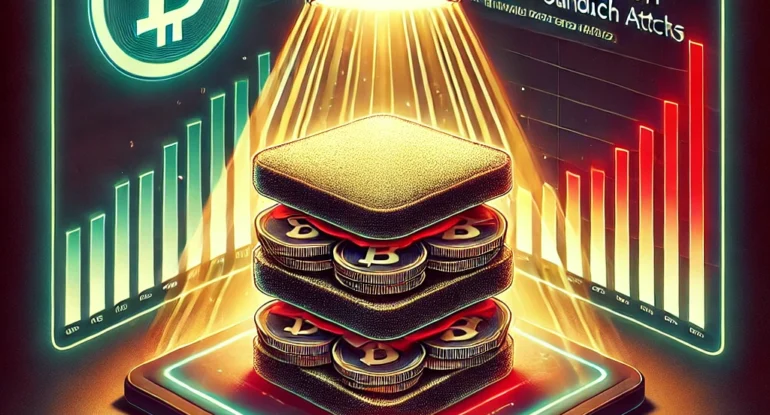Solana Validator Extracts $13M in One Month Through MEV Sandwich Attacks

A recent investigation has revealed that a Solana validator named DeezNode earned over $13 million in a single month through Maximum Extractable Value (MEV) sandwich attacks, raising fresh concerns about fairness and transparency in the Solana ecosystem.
The Exploit: 1.55 Million Transactions, 65,800 SOL in Profits
- According to Vitorpy, founder of DarkLake, DeezNode’s sandwich bot executed 1.55 million transactions in December 2024 alone.
- The activity generated 65,800 SOL in profits—valued at $13 million at the time—by strategically manipulating trades on decentralized exchanges (DEXs).
- If extrapolated annually, this would equate to over $160 million in user-extracted value.
What Are MEV Sandwich Attacks on Solana?
- MEV sandwich attacks occur when a validator or bot front-runs a user’s trade and back-runs it to capture price spreads, effectively sandwiching the user’s transaction.
- These attacks exploit Solana’s leader-based block production and lack of a public mempool, which grants certain validators visibility into unconfirmed transactions.
- As a result, users receive worse trade execution, while the attacker profits off the transaction’s placement and timing.
Jito’s Public Mempool Shutdown May Have Backfired
- Jito, a Solana MEV infrastructure provider, previously shut down its public mempool in an attempt to mitigate MEV exploitation.
- However, this decision pushed transaction ordering into private networks, including those operated by DeezNode, increasing the speed and efficiency of MEV extraction.
“Jito’s public mempool shutdown didn’t eliminate MEV—it pushed it into private networks,” Vitorpy wrote.
Solana’s Architecture: A Double-Edged Sword
- Solana’s fast block times and leader-based system create ideal conditions for MEV, while making it difficult to detect attacks in real time.
- Some argue this undermines Solana’s Real Economic Value (REV) metric, which is often cited to compare Solana’s performance against chains like Ethereum.
- Mert, CEO of Helius Labs, claims sandwich attacks only contribute a single-digit share of Solana’s REV, stating that most revenue comes from prioritization fees.
Industry Reaction and Path Forward
- The crypto community is actively debating potential solutions, with networks like Cardano, BNB Chain, Algorand, and MultiversX exploring protocol-level MEV mitigation tools.
- Critics argue that unchecked MEV threatens the integrity of on-chain trading and erodes user trust in blockchain networks.
- Calls for open-source mempools, transaction privacy tools, and fair ordering protocols are growing louder.
Hidden Insight
If private mempools continue to fuel MEV extraction on Solana, validators may increasingly prioritize profit over network integrity. Without transparent ordering or user protections, Solana risks losing credibility as a fair trading platform, especially as institutional capital demands stronger guarantees.
Hidden Insight
If private mempools continue to fuel MEV extraction on Solana, validators may increasingly prioritize profit over network integrity. Without transparent ordering or user protections, Solana risks losing credibility as a fair trading platform, especially as institutional capital demands stronger guarantees.









